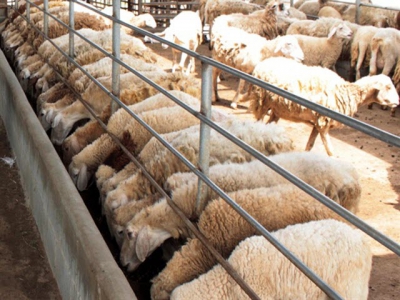Ninh Thuận to breed more sheep, goats for commercial production

Sheep are bred at a farm in Ninh Thuận Province’s Thuận Nam District. – VNA/VNS Photo Công Thử
Ho Chi Minh City – The south-central province of Ninh Thuận, the country’s largest animal producer, is strengthening measures to breed more sheep, goats, pigs and other animals for commercial production.
The province has more than 160,000 sheep and 137,900 goats, ranking first in the country as a sheep producer and eighth in goat production, according to the province’s Department of Agriculture and Rural Development.
The province has more than 112,000 oxen and cows, 3,800 buffalos and 92,000 pigs.
In Ninh Thuận, which has the least rainfall in the country, farmers mostly breed animals outdoors and on a small scale.
Development projects have taken up land that was once used for outdoor rearing areas for sheep and goats.
Climate change has also caused a decline in quality of natural grass fields and water resources for animals, affecting their yield and quality.
To expand the local breeding industry, Ninh Thuận has provided soft loans for farmers to plant grass fields and invest in clean water provision for animals.
Local authorities have helped rice farmers switch to growing grasses for animals in areas that often lack irrigation water and plant only one rice crop a year.
In the first five months of the year, farmers have so far planted more than 1,200ha of grasses with a total output of 163,000 tonnes, meeting 31 per cent of food for the province’s animals, according to the Department of Agriculture and Rural Development.
The province’s Agriculture Extension Centre has provided advanced rearing techniques for animal farmers, including sterilising barns monthly and providing periodic baths for animals.
Phan Quang Thựu, deputy director of the Department of Agriculture and Rural Development, said the province was enhancing co-operation among farmers, scientists, local authorities and companies to create value chains for breeding animals.
The province had developed co-operatives to create stronger links between farmers and companies, Thựu said.
According to Phạm Minh Quang, director of the Tân Hà Co-operative in Thuận Nam District’s Nhị Hà Commune, his co-operative has applied advanced techniques in building animal barns, choosing animal strains and breeding techniques, and treating animal diseases.
With the decline of natural grass fields, the co-operative has switched from feeding sheep on grass fields to indoor rearing, which has helped to reduce risks and disease, making the sheep grow faster.
The co-operative has invested in planting more than 1 ha of grass which has an output of 700 kilos a day that feeds the co-operative’s sheep.
The co-operative sells about 100 male sheep every three months, while each sheep weighs about 30 kilos.
The co-operative earns revenue of VNĐ1 billion (US$43,000) a year.
Under a provincial People’s Committee plan, Ninh Thuận targets having a total of 190,000 sheep, including 45,000 females, by 2020.
Có thể bạn quan tâm
 Can Tho bolsters agricultural cooperation with Cuba
Can Tho bolsters agricultural cooperation with Cuba Cuba is looking to bolster cooperation with the Mekong Delta city of Can Tho in the production of rice, fruits, and aquaculture, in line with agricultural
 Vietnam to host its first World Rice Conference
Vietnam to host its first World Rice Conference At the conference, participants will compare notes on the short term expectation for the domestic and international rice trade
 India rice prices recover; low Thai rates dampen Vietnamese offers
India rice prices recover; low Thai rates dampen Vietnamese offers Rice export prices in India recovered this week after demand improved, while rates for the Vietnamese variety eased.